Originally published on October 21, 2022
Today I gave a 90-minute presentation + Q&A to a group of executives interested in my perspective on the future of energy. I focused on 5 trends shaping the future of energy that I believe most commentators underestimate or overlook:
1) Fossil fuels’ fundamentals remain strong
2) Anti-fossil-fuel policies have caused a global crisis
3) The anti-fossil-fuel establishment is in denial
4)Humanistic thinking about fossil fuels is on the rise
5) Many people are now thinking differently about fossil fuels\
The following is the basic presentation in talking point form.
-
I’m an energy expert with a 15-year track record of correctly predicting major trends: “peak oil” wouldn’t happen, fossil fuel demand would grow, climate danger would decline, “green energy” policies would be deadly.
Unlike most “experts,” my analysis of the future is credible.
-
The primary reason I have been right about major trends in energy is that I am not just an energy expert but also a philosopher, which has enabled me to observe and avoid 1) invalid thinking methods, 2) false assumptions, and 3) anti-human values that many “experts” operate on.
-
Invalid thinking methods
Many experts commit the error of ignoring the benefits of fossil fuels and focusing exclusively on negative side-effects. This has led them to underestimate fossil fuel demand and underestimate the damage of “green energy” policies.
-
Ignoring the benefits of fossil fuels has also led most energy experts to ignore the enormous “climate mastery benefits” of fossil fuels— their ability to power machines that neutralize climate danger via heating and air conditioning, irrigation, building resilient structures, etc.
-
False assumptions
Many experts operate on the false assumption I call “the delicate nurturer”: Earth exists in a delicate, nurturing balance but human beings are “parasite-polluters” whose impact inevitably destroys the delicate balance and us with it.
-
In reality, Earth is not a “delicate nurturer” but “wild potential” (dynamic, deficient, dangerous) and human beings are not “parasite-polluters” but “producer-improvers” whose impact generally produces new value and therefore makes the world much more livable for us.
-
The “delicate nurturer” and “parasite-polluter” assumptions lead experts to incorrectly expect that our high-impact way of life will lead us to run out of resources (e.g., “peak oil”) or catastrophically destabilize vital systems (e.g., climate catastrophism).
-
Anti-human values
Many energy experts evaluate the state of the planet, including its climate, using an anti-human standard of value: lack of human impact. Versus the standard of human flourishing, which I use.
-
Experts who are on the standard of “lack of human impact” treat climate impact as intrinsically bad and therefore evaluate today’s climate as catastrophically bad even though we are actually safer from climate than ever in large part due to fossil-fueled climate mastery.1
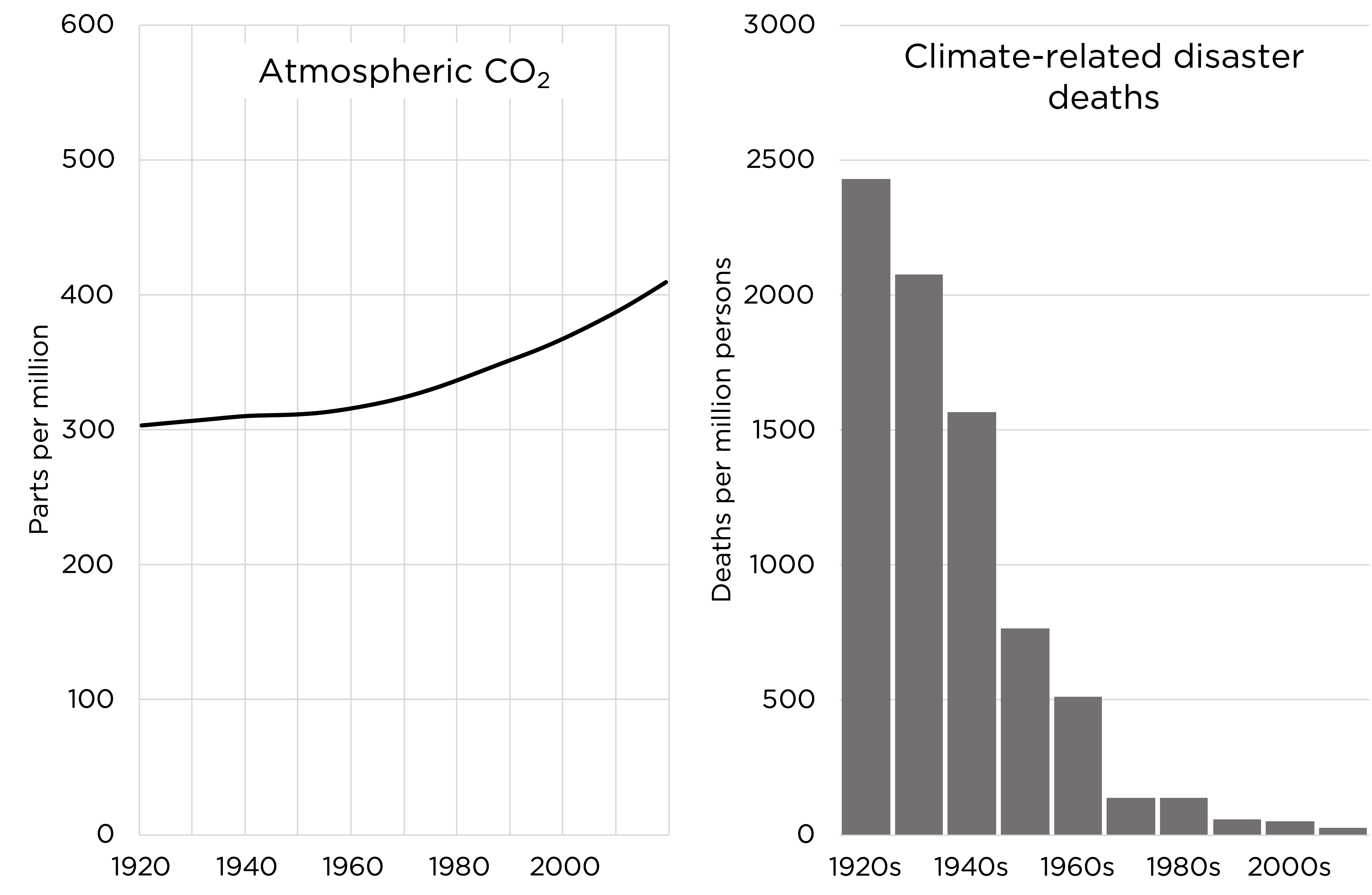
-
Experts who are on the standard of “lack of human impact” are unconcerned with the benefits of fossil fuels, including the climate mastery benefits, to human flourishing, or the damage of “green” policies to human flourishing. Because their standard is not human flourishing.
-
A summary of how I differ from most energy experts:
1. I consider positives and negatives of fossil fuels, not just negatives
2. I recognize Earth is “wild potential,” not a “delicate nurturer”
3. I evaluate energy by the standard of human flourishing, not lack of impact -
I also have the advantage of a research team that also avoids the many philosophical errors prevalent today, as well as constant interactions with leaders in politics and industry so that I have firsthand exposure to these worlds rather than second-hand, often distorted accounts.
-
While I can’t make precise price or policy predictions (can anyone?), I can use my knowledge of philosophy, my research, and my high-bandwidth connection to politicians and industry to identify overlooked or underestimated trends that will shape the future of energy.
-
Trend 1: Fossil fuels’ fundamentals remain strong
Despite a decade of claims that we are in an “energy transition” in which fossil fuels will be rapidly replaced by superior, mostly solar and wind alternatives, fossil fuels have fundamental strengths that are not replaceable anytime soon.
-
Fossil fuels provide 80+% of the world's energy and are still growing, despite 1) decades of intense competition from alternatives and 2) worldwide cultural and political hostility.
Clearly there are some strong fundamentals at work here.2
-
Fundamental: Fossil fuels are uniquely cost-effective, a combo of:
- affordable
- reliable—available when needed, in the quantity needed
- versatile—able to power every type of machine, not just electrical
- scalable—for billions of people in thousands of places
-
Fossil fuels are uniquely cost-effective due to:
1: Physical attributes: natural storage, natural concentration, natural abundance—a combo currently shared only by nuclear
2: Generations of innovation and work by industry—which nuclear hasn’t had, mostly because of its near-criminalization -
Fundamental: Solar and wind, the politically favored alternative, has intractable problems with cost (unreliability requires costly infrastructure duplication), versatility (only electricity) and scalability (depends on “reliables” and diluteness causes unprecedented material needs).
-
Recent price spikes of fossil fuels do not reflect some new lack of cost-effectiveness on the part of fossil fuels, but rather the devastating effects of “green energy” efforts to artificially restrict the supply of fossil fuels on the false promise that unreliable solar and wind can replace them.
-
Fundamental: The world desperately needs more energy.
Billions of people lack the cost-effective energy they need to flourish. 3 billion use less electricity than a typical American refrigerator. 1/3 of the world uses wood or dung for heating and cooking. Much more energy is needed.3
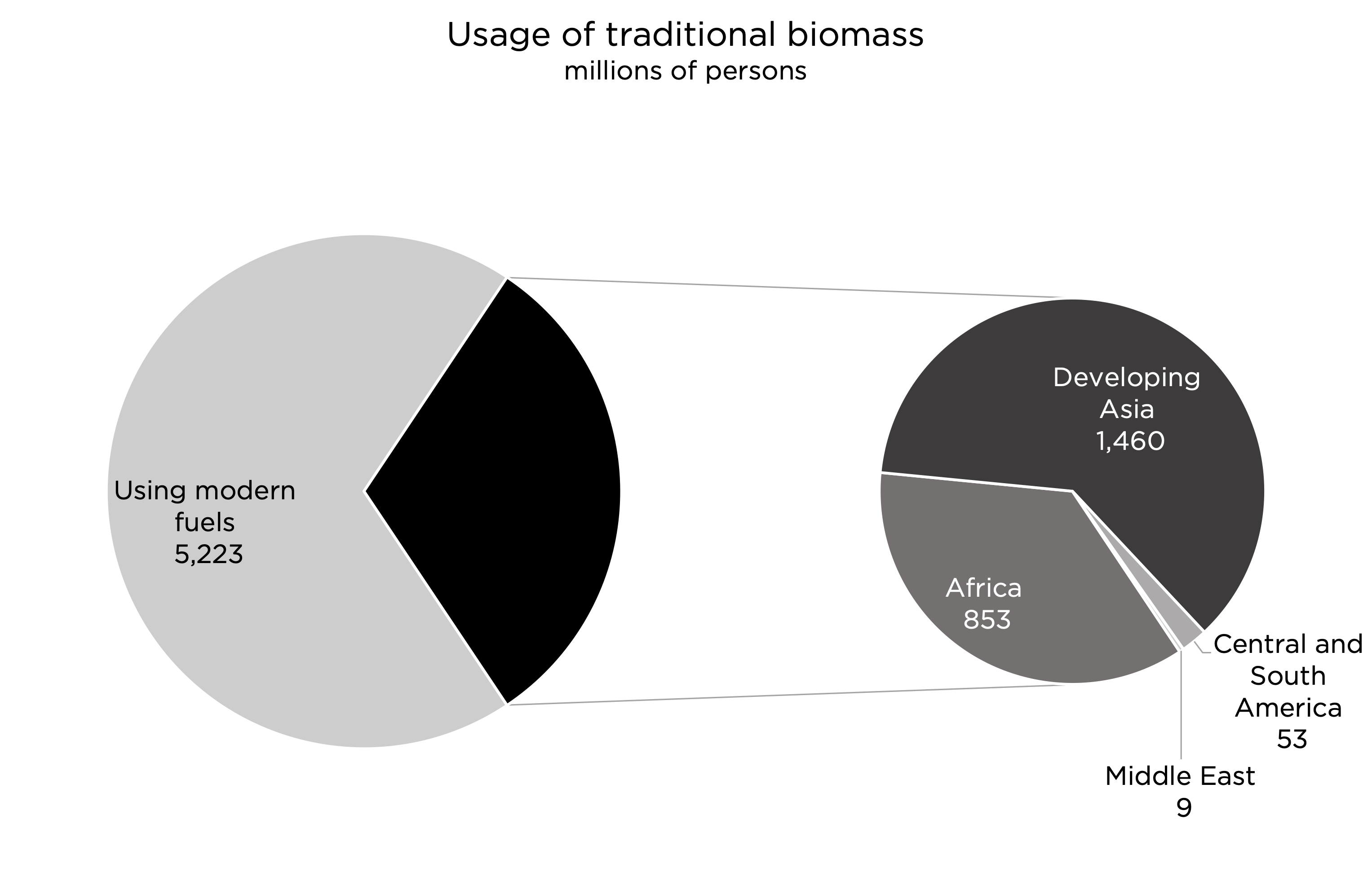
-
Summary of Trend 1: Fossil fuels will continue to have fundamental advantages due to 1) their unique cost-effectiveness and 2) the world's need for much more energy.
-
Recommendation for investors: Be on the lookout for opportunities in the fossil fuel space that others are missing because they’re underestimating the superior fundamentals of fossil fuels. Just make sure you can navigate the political risk.
And that risk might be going down.
-
Trend 2: Anti-fossil-fuel policies are causing a global crisis
Restrictions on fossil fuel investment, production, and transport have artificially restricted supply, while promises that demand would be replaced by alternatives have proved false.
And much of the voting public knows this.4
-
For the last 15+ years, the anti-fossil-fuel movement has successfully restricted fossil fuel investment, fossil fuel production, and fossil fuel transport on the false grounds that 1) fossil fuels’ climate impacts were an “emergency” and 2) unreliable solar and wind could rapidly replace fossil fuels.
-
While the anti-fossil-fuel movement has not come anywhere near achieving its goal of rapidly eliminating fossil fuel use, just by slowing the growth of fossil fuel use it has caused a global energy crisis in which the world hasn’t been able to handle post-pandemic demand and less Russian energy.
-
The world is now seeing the consequences of just a small sliver of the net-zero agenda:
- Wealthy Europe is experiencing mass-hardship, deindustrialization, and fear of winter.
- Poor nations, e.g., Bangladesh, are being outbid for today’s scarce energy supplies.5
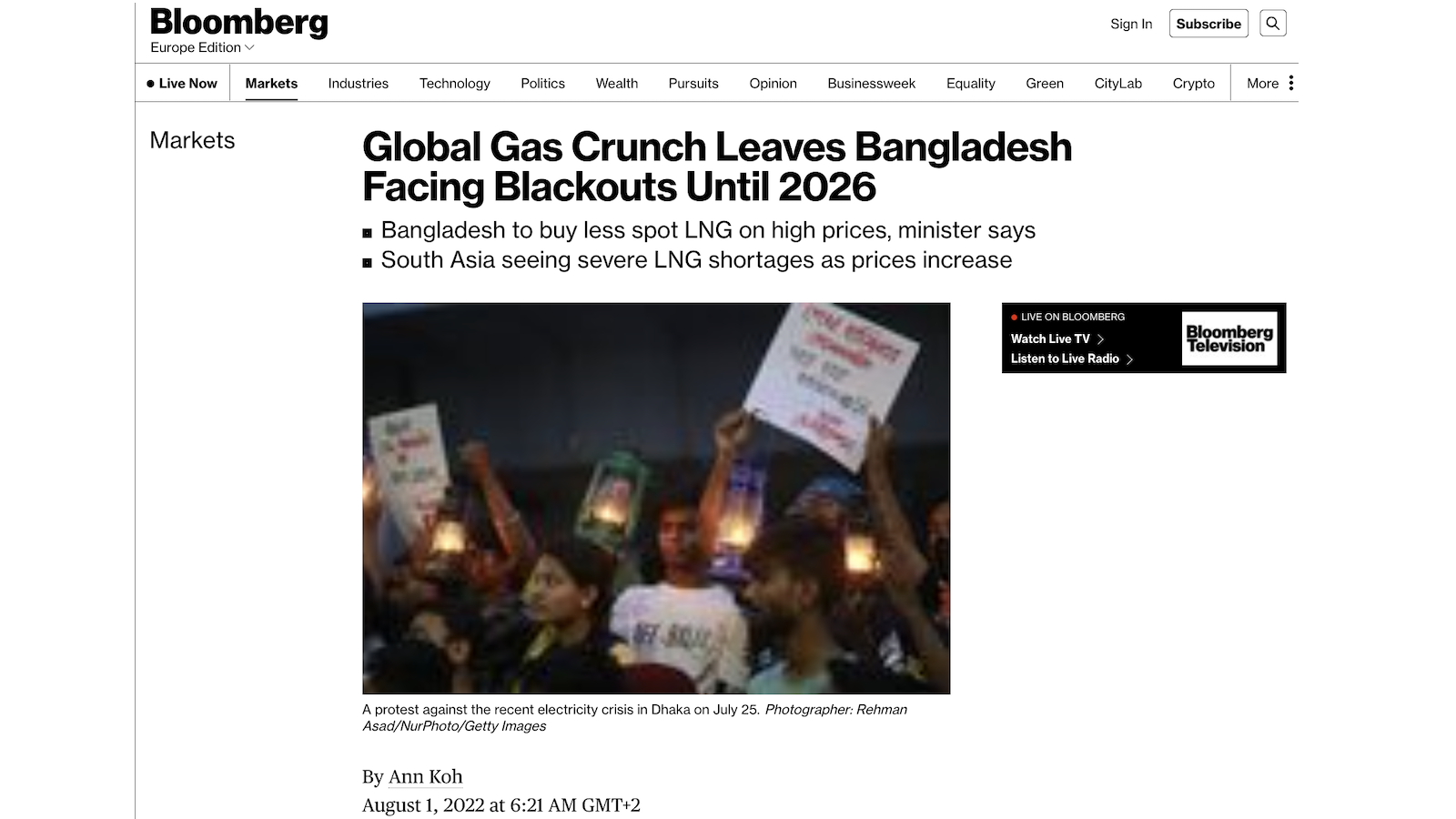
-
For the last decade, the idea of rapidly eliminating fossil fuel use was considered reasonable by the (misinformed) public. Now that a sliver of that agenda has caused a global crisis, people around the world are waking up and beginning to demand more pro-fossil-fuel policies.
-
Recommendation: Be wary of all rosy claims about alternatives from anti-fossil-fuel “experts.” To my knowledge not one of these people warned that anti-fossil-fuel policies would cause an energy crisis. Their thinking has demonstrably been distorted.
And most are unrepentant…
-
Trend 3: The anti-fossil-fuel establishment is in denial
In the face of clear evidence that fossil fuels’ fundamentals are strong and that anti-fossil-fuel policies have caused a crisis, the anti-fossil-fuel establishment is playing a denial game.
This may (and should) further discredit it.
-
Instead of admitting that suppressing fossil fuel investment, production, and transport in a world that needs far more energy is clearly responsible for today’s crisis, today’s anti-fossil-fuel establishment is denying this by placing primary blame on Putin and (absurdly) the fossil fuel industry.
-
Today’s high fossil fuel prices are not primarily a “Putin price hike.”
They are caused by global anti-fossil-fuel policies—which made fossil fuel prices artificially high before Putin’s war and prevented the free world from quickly increasing production in response.
-
The anti-fossil-fuel movement has the gall to chastise the fossil fuel industry for not sufficiently ramping up production post-pandemic and post-Putin-invasion. But this insufficient ramp-up is the result of fossil fuel policies that restrict and punish new attempted production!6
-
Another establishment attempt to deny responsibility for the energy crisis is to claim we just needed government to push solar and wind even more. But places that did this most, e.g., Germany, are suffering the most. Because solar and wind is nowhere near able to replace fossil fuels.
-
Another establishment attempt to deny responsibility for the energy crisis is to blame it on “climate change.” E.g., blackouts and high food prices are “climate change.” BS. With low-cost, reliable energy, blackouts are rare and food is cheap, whatever our climate impact.7
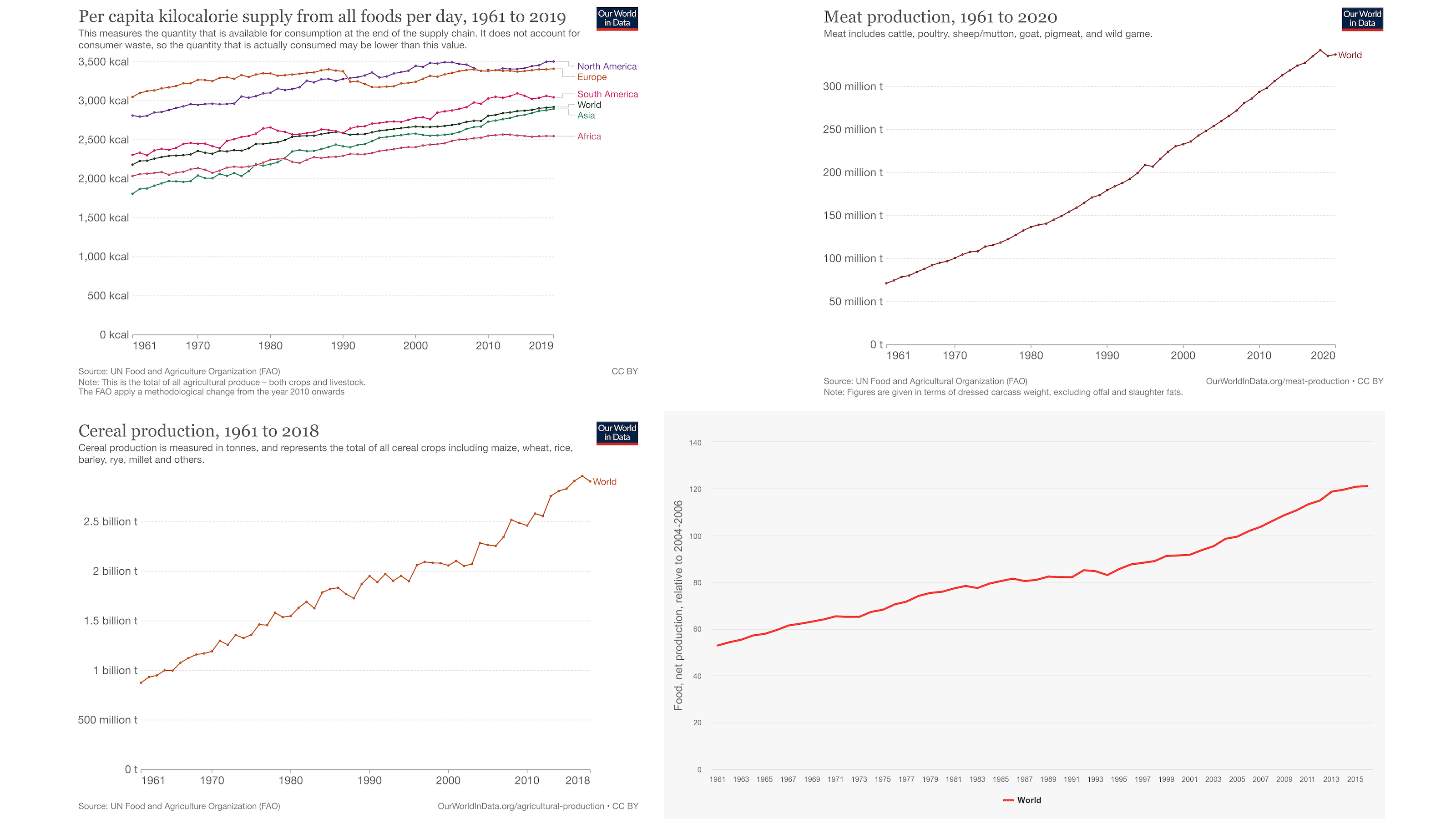
-
A final establishment attempt to deny responsibility for the energy crisis is to ignore it and instead just incessantly talk about “climate crisis.” But while “climate change”—humans impacting climate—is real, “climate crisis” is not. We should focus on the energy crisis.
-
The world is slowly becoming warmer—at a cold point in geological history, when far more people die of cold than of heat. Thanks in large part to fossil fuels, climate-related disaster deaths have decreased 98% over the last century. This isn’t a crisis. Lack of fossil fuel is a crisis.8

-
The anti-fossil-fuel establishment’s attempt to deny responsibility for the energy crisis and its refusal to reverse course is causing it to lose credibility around the world, as many harmed by the energy crisis protest and many voters demand more fossil fuels.
-
Recommendation to businesses: Don’t assume that the anti-fossil-fuel establishment will keep its status. Before the establishment’s policies caused a crisis it seemed unstoppable—and allying with it via bogus “net zero” commitments seemed profitable and risk-free. No longer.
-
As more people realize that anti-fossil-fuel policies are deadly and that therefore “net zero” is catastrophic, companies that promote these ideas and pledge to follow them will be vulnerable. Witness bankers backing away from anti-fossil-fuel commitments.
This may accelerate now that…9
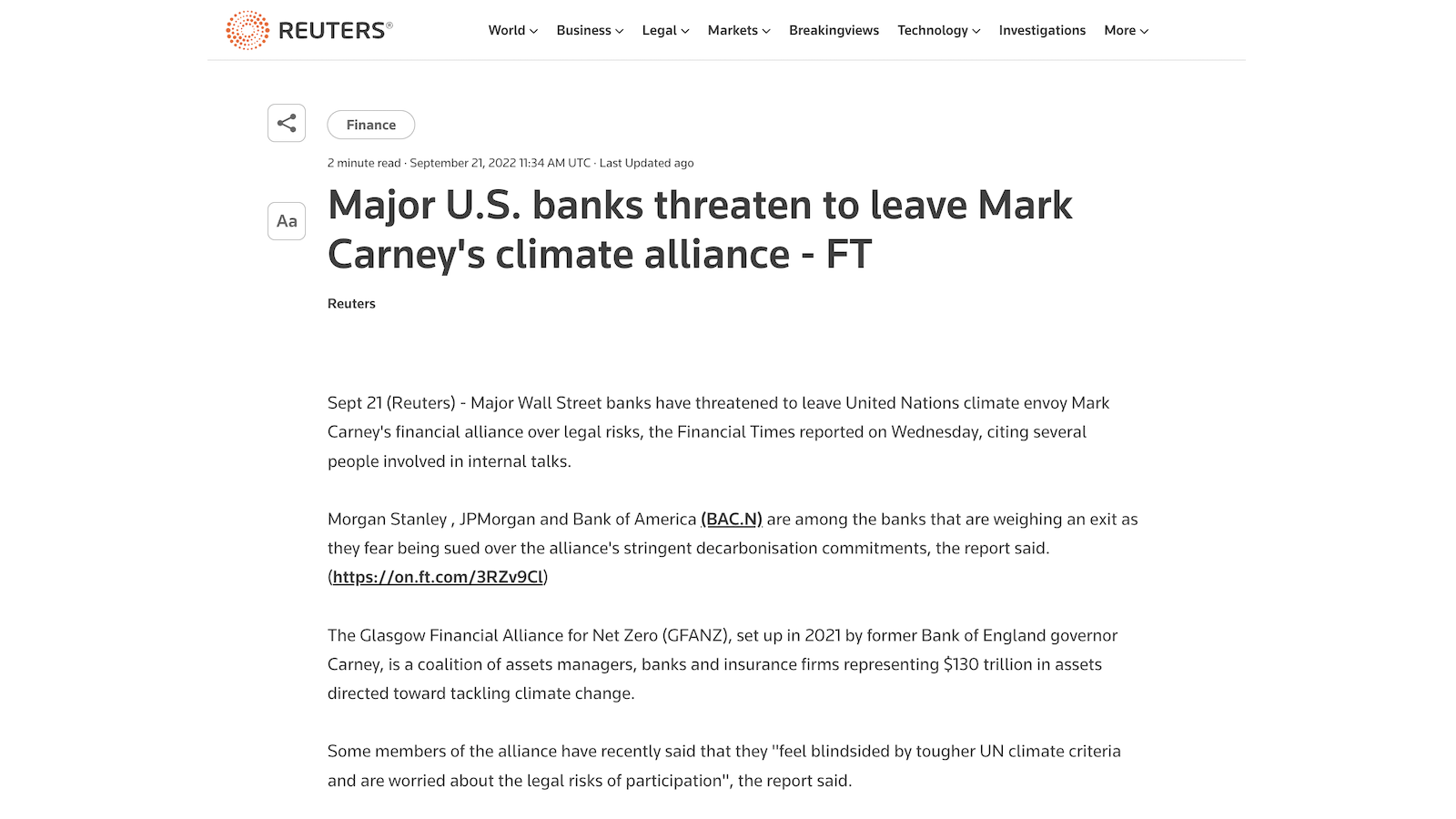
-
Trend 4: Humanistic thinking about fossil fuels is on the rise
A new, influential group of thinkers is thinking about fossil fuels in a pro-human, evenhanded, precise way—not just focusing on or exaggerating their negatives.
This is breaking the “moral monopoly” of the anti-fossil-fuel movement.
-
Much of the anti-fossil-fuel establishment’s success in promoting horrific fossil fuel elimination policies is that they have enjoyed a “moral monopoly”—a position in which they were considered the only moral option.
This was never deserved and is now being eroded.
-
The key to the anti-fossil-fuel establishment’s “moral monopoly” has been a false alternative re: fossil fuels and climate: you’re either
1. a “climate change believer” who opposes fossil fuels or
2. a “climate change denier” who supports fossil fuelsSince humans do impact climate, most chose 1.
-
In the last 10 years we have seen the rise of “climate change believers” who support fossil fuels.
I call these “energy humanists,” because the core of their position is to think about all effects of energy, including fossil fuels, on human life, not just negative climate side-effects.
-
When you look at the full effects of fossil fuels in an evenhanded and precise way, you quickly conclude that fossil fuels have enormous, near-term-irreplaceable benefits and that fossil fuels’ climate side-effects are not catastrophic, let alone apocalyptic. But losing fossil fuels’ benefits is.
-
In the last few years there has been a wave of bestselling, highly influential “energy humanist” books: Apocalypse Never (2020) by Michael Shellenberger, False Alarm (2020) by Bjorn Lomborg, Unsettled (2021) by Steven Koonin, and Fossil Future (2022) by me.10
-
The anti-fossil-fuel establishment has done an embarrassingly bad job at countering the “energy humanist” books. Their main tactics have been:
- Suppression on social media
- Straw-men attacks
- False personal accusations
They use these because they can’t refute our core arguments.
-
Energy humanist arguments for fossil fuels are rapidly and deservingly more prominent in light of today’s energy crisis.
Many of us warned that anti-fossil-fuel policies would cause such a crises, while our opponents assured the world that these policies would turn out great.
-
Recommendation for energy-related companies: Utilize the latest humanistic arguments on energy and climate issues throughout your communications: recruiting, employee relations, lobbying, investor relations, etc.
For an intro to these arguments check out EnergyTalkingPoints.com.
-
Trend 5: Many people are thinking differently about fossil fuels
The combination of a global crisis caused by anti-fossil-fuel policies and the rise of humanistic arguments for fossil fuels is rapidly changing perception and short-term policy.
And there is potential for long-term policy change.
-
Evidence of changing fossil fuel perception: In March, the White House, trying to portray itself as pro-fossil-fuel, absurdly claimed that “there is nothing standing in the way of domestic oil production.” Vs. When Biden ran, he felt comfortable saying “I guarantee you, we’re going to end fossil fuels.”11
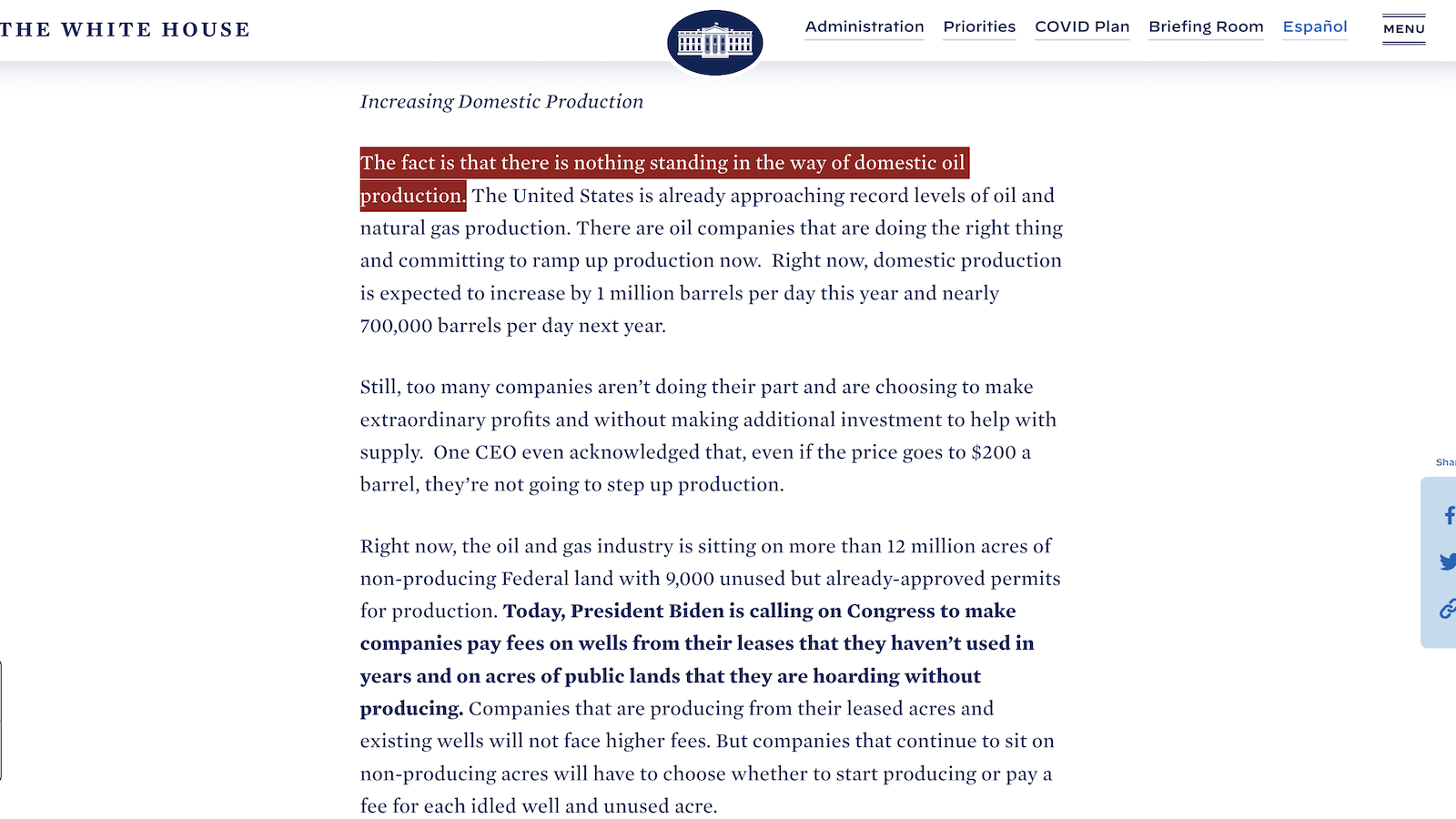
-
President Biden made a 180° change in rhetoric as soon as high energy prices threatened to collide with November election prospects of Democrats. Instead of taking credit for hampering fossil fuel production, he now blames everyone but himself.12
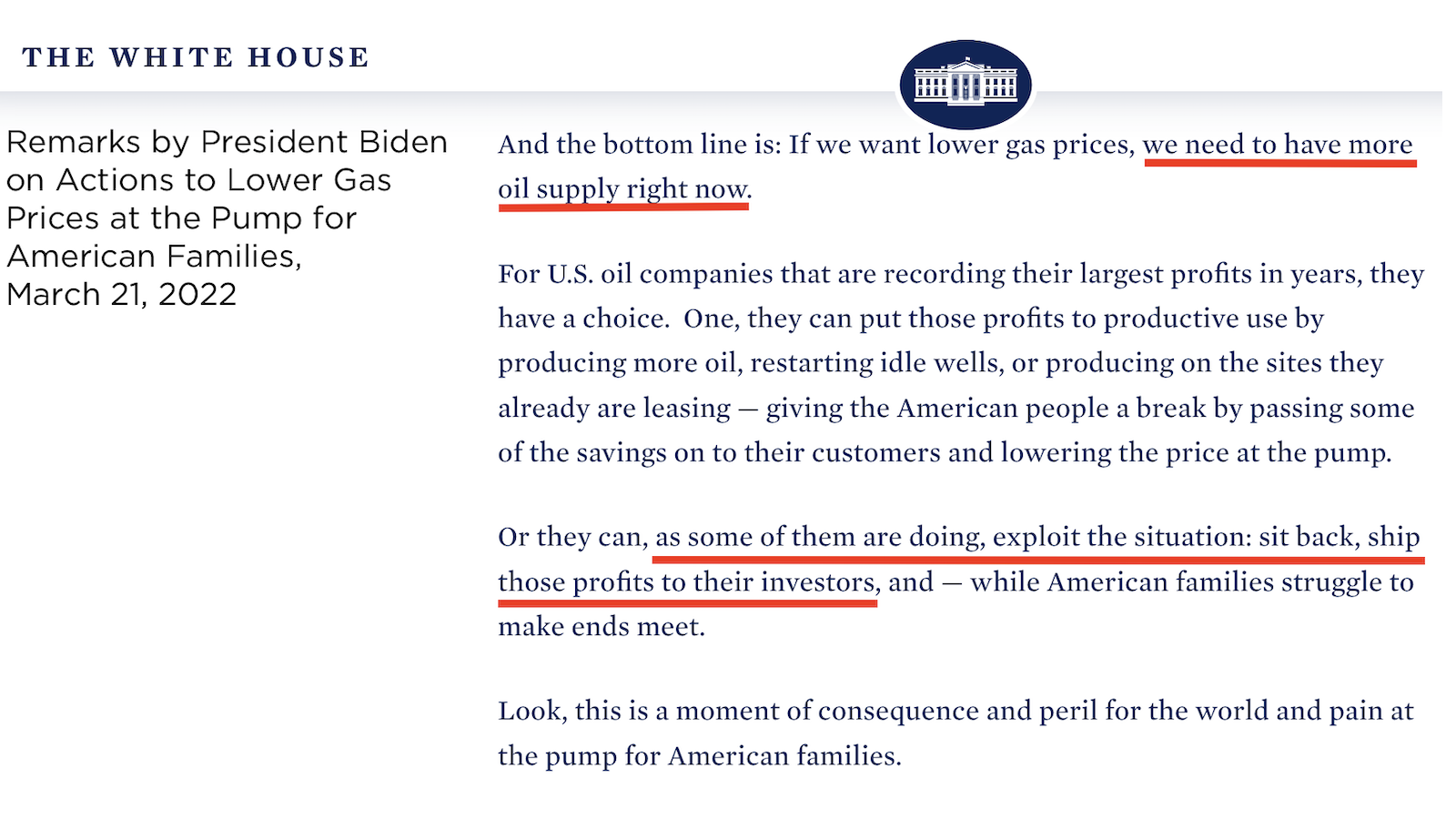
-
Evidence of changing fossil fuel perception: Where climate activists engaging in publicity stunts used to garner great sympathy, their stunts are increasingly condemned by a public that wants lower fossil fuel prices.13
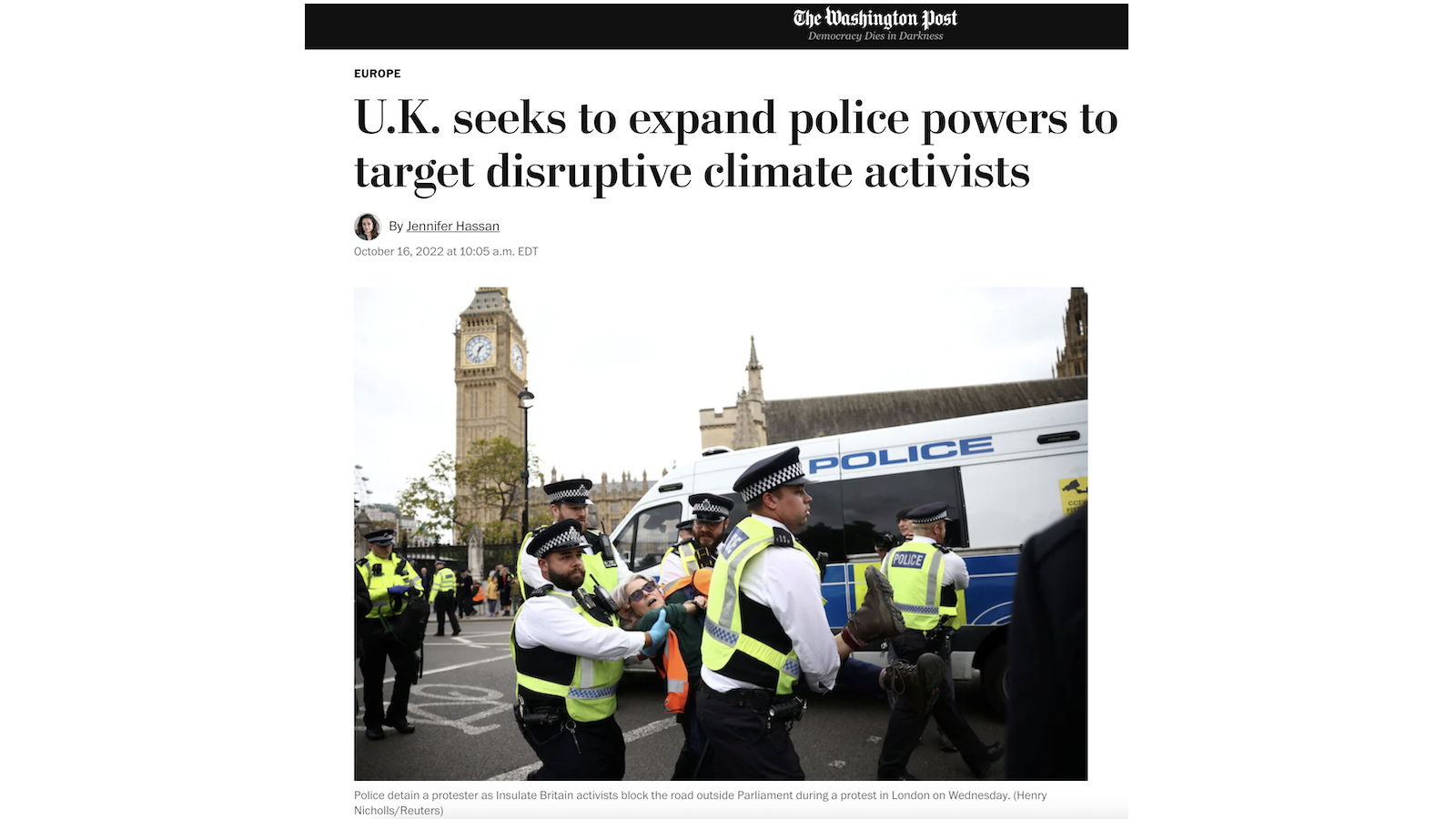
-
Evidence of fossil fuel perception change: Elon Musk, often a bellwether of public opinion, has gone from a fossil-fuel-attacker and climate catastrophist to someone who supports near-term oil and gas development and reassures the public that we don’t face imminent climate catastrophe.14
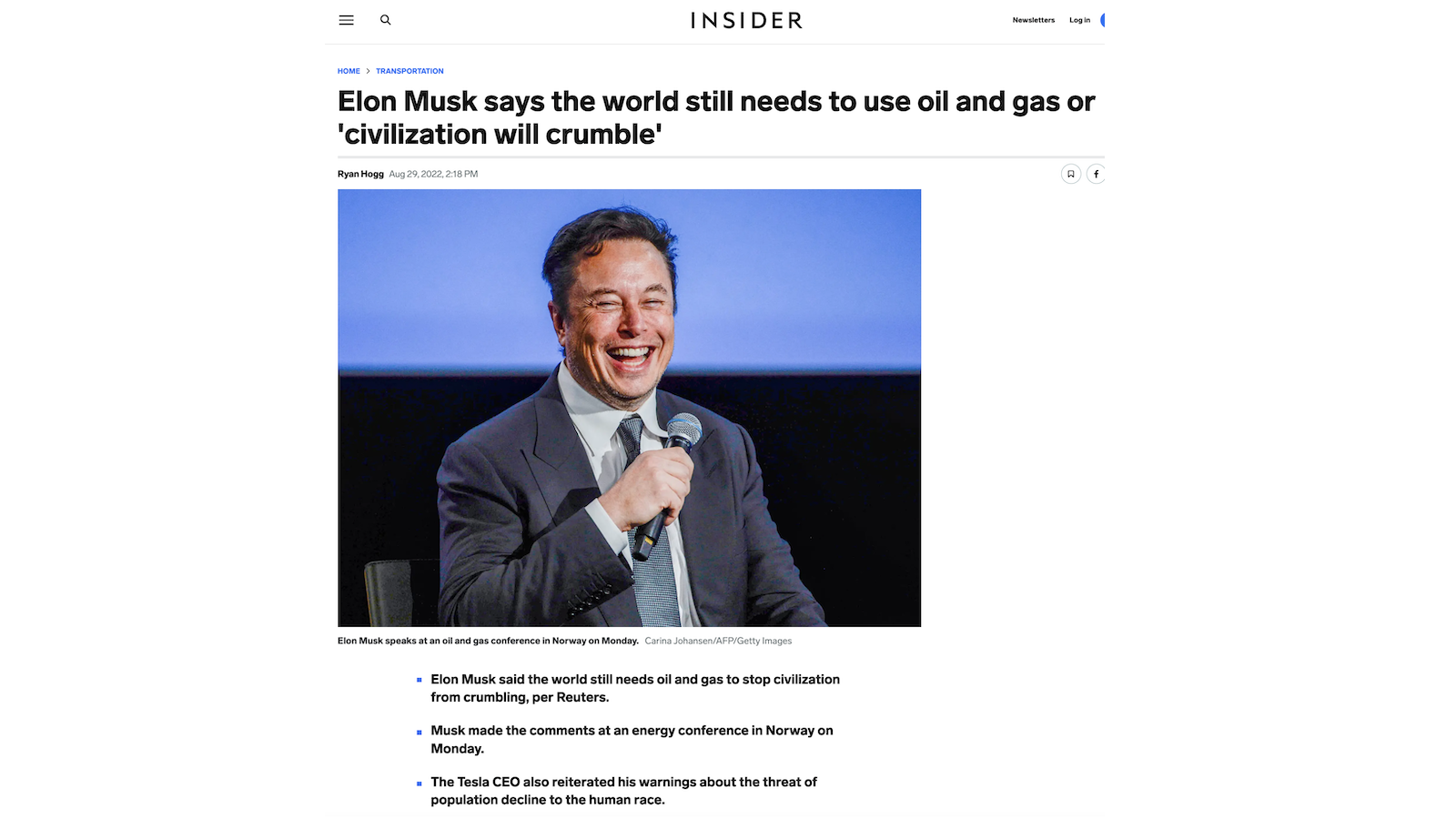
-
Short-term policy change: In Europe, coal power plants are being reactivated to meet demand. Governments promise this is a temporary measure but it reveals the gap between supply and demand left by the policies that foolishly destroyed domestic fossil fuels with no replacement.15
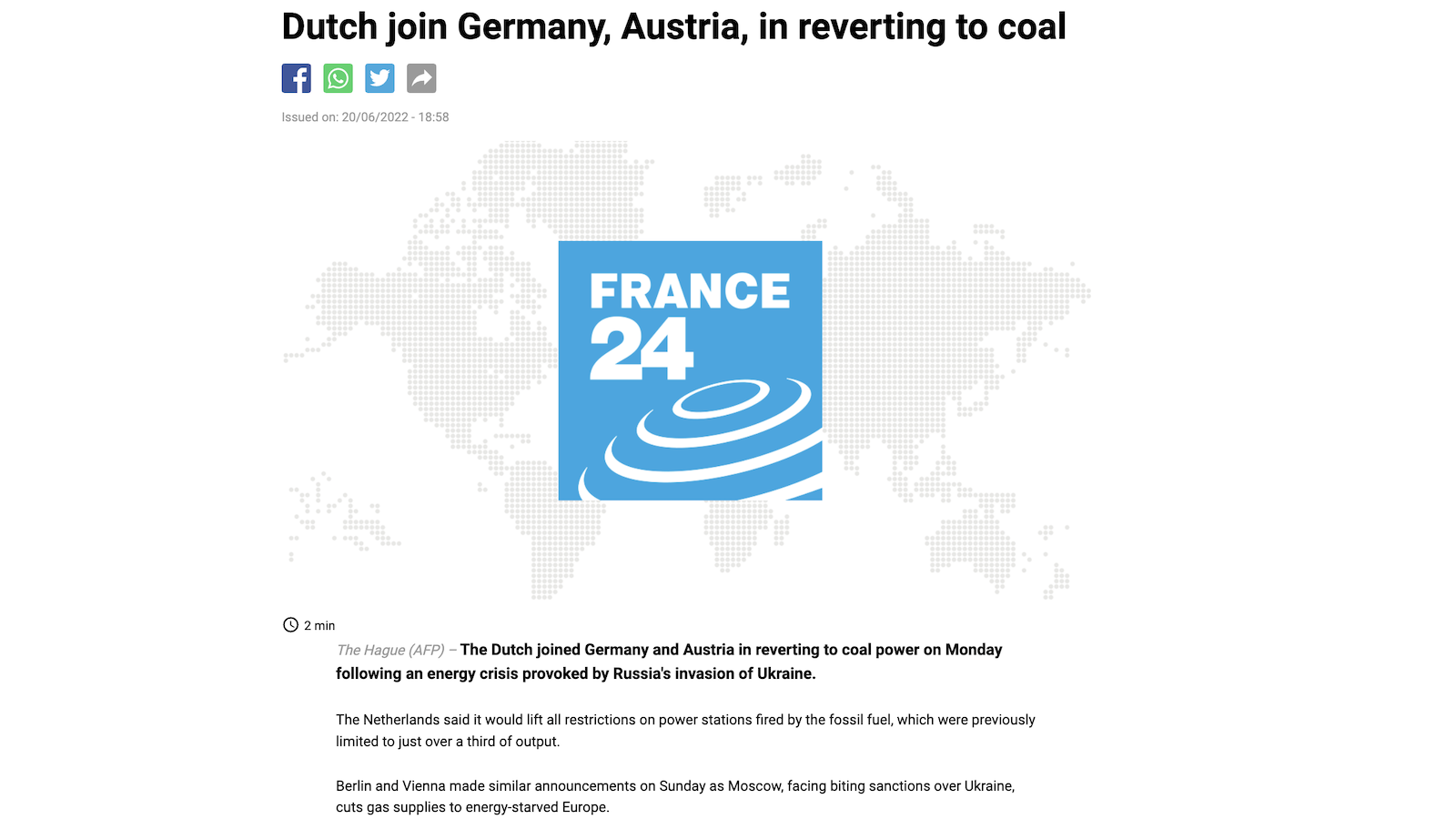
-
Short-term policy change: In the UK, where policies have encouraged wind power and decimated nuclear and coal, the new government has lifted the preemptive fracking ban to bolster domestic natural gas supply in recognition of today’s energy realities.16
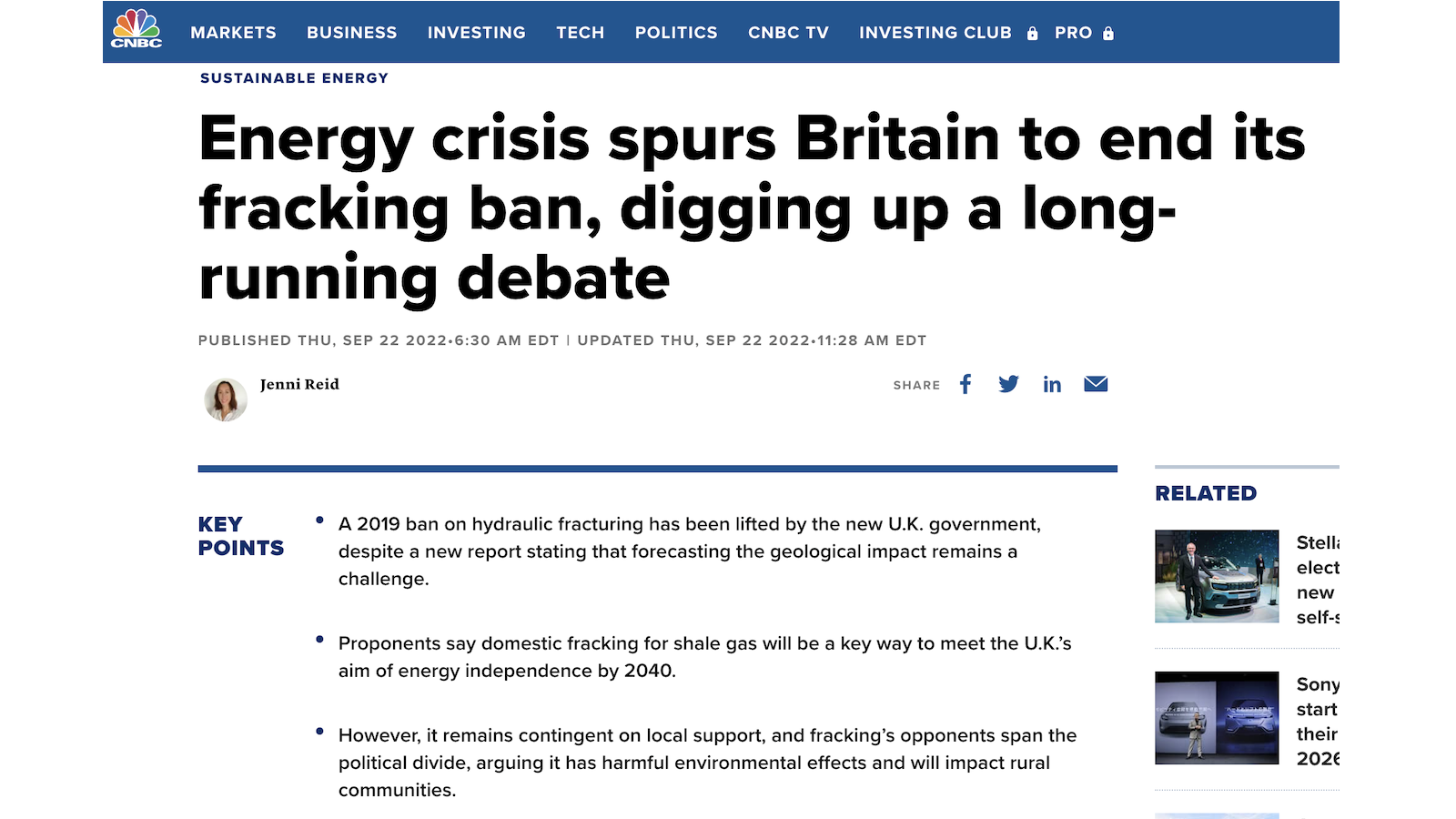
-
Evidence of more humanistic thinking and policies: nuclear energy, long opposed by the green movement in favor of unreliable solar and wind, is now being embraced around the world—including significant policy reversals in California and Germany.17
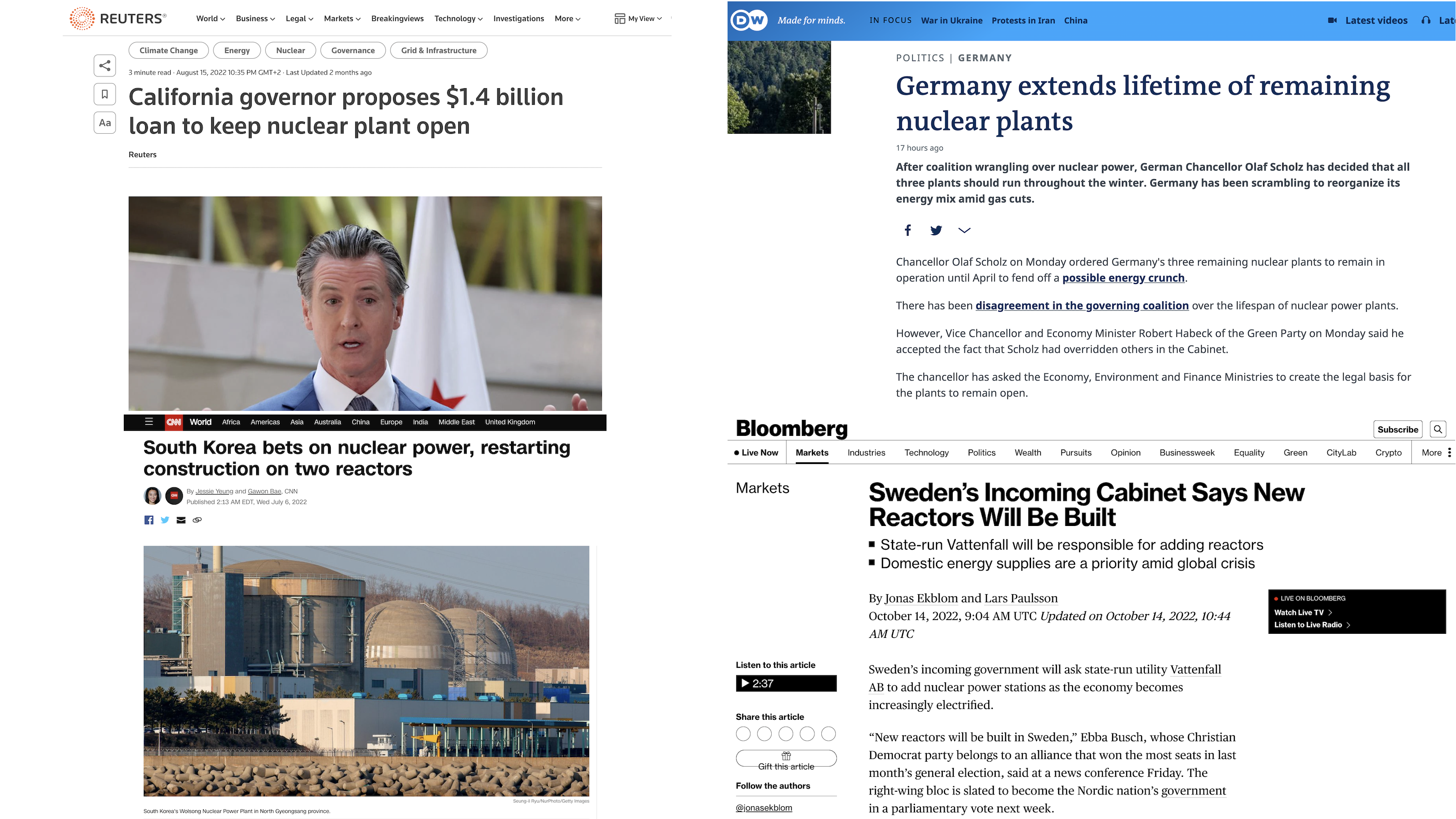
-
While the changes in fossil fuel perception and short-term policy are encouraging, most nations have not yet reversed their long-term commitment to rapidly eliminating fossil fuel use. E.g, in the US congress just passed the disastrous “Inflation Reduction Act.” The Energy Litmus Test
-
Recommendation: Take advantage of the opportunity to promote long-term fossil fuel policy change:
- Implicate the anti-fossil-fuel movement for causing today’s crisis
- Spread energy humanist arguments as efficiently as possible
- Promote positive, pro-fossil-fuel and pro-alternative policies
-
Implicate the anti-fossil-fuel movement for causing today’s crisis
The public understanding of who is implicated for a crisis and who is vindicated by a crisis has huge effects on influence going forward.
Today’s anti-fossil-fuel establishment deserves to be implicated for today’s crisis.
-
Here are some resources implicating today’s anti-fossil-fuel establishment for today’s crisis:
How a fake climate emergency created a real energy emergency
Testimony: "How the Biden Administration and the Global Anti-Fossil-Fuel Movement Caused an Energy Crisis and Inflated Our Cost of Living"
US Democrats are engaging in epic denial on oil and gasoline prices
Europe’s energy security crisisI also highly recommend Michael Shellenberger’s Substack in this regard (and others).
-
Spread energy humanist arguments as efficiently as possible
To maximize our chances at long-term policy change we need to be persuasively efficient. To this end I have created EnergyTalkingPoints.com, which provides concise, well-referenced arguments on every conceivable issue.
-
Promote positive, pro-fossil-fuel and pro-alternative policies
Long-term policy change requires not just criticizing bad policies but advancing good policies that liberate fossil fuels and alternatives. To this end I have created a 5-point Energy Freedom Platform.
The Energy Freedom Platform -
Summary:
1) Fossil fuels’ fundamentals remain strong
2) Anti-fossil-fuel policies have caused a global crisis
3) The anti-fossil-fuel establishment is in denial
4) Humanistic thinking about fossil fuels is on the rise
5) Many people are thinking differentlyWe can leverage these trends to change policy!
-
To maximize your understanding of the future of energy, read my new book Fossil Future: Why Global Human Flourishing Requires More Oil, Coal, and Natural Gas—Not Less.
References
-
UC San Diego - The Keeling Curve
For every million people on earth, annual deaths from climate-related causes (extreme temperature, drought, flood, storms, wildfires) declined 98%--from an average of 247 per year during the 1920s to 2.5 in per year during the 2010s.
Data on disaster deaths come from EM-DAT, CRED / UCLouvain, Brussels, Belgium – www.emdat.be (D. Guha-Sapir).
Population estimates for the 1920s from the Maddison Database 2010, the Groningen Growth and Development Centre, Faculty of Economics and Business at University of Groningen. For years not shown, population is assumed to have grown at a steady rate.
Population estimates for the 2010s come from World Bank Data.↩
-
IEA - Access to affordable, reliable, sustainable and modern energy for all
Robert Bryce - A Question of Power: Electricity and the Wealth of Nations↩
-
Alex Epstein - How a fake climate emergency created a real energy emergency↩
-
NYT - ‘Crippling’ Energy Bills Force Europe’s Factories to Go Dark
WSJ - Europe Fears a Long, Cold Winter if Russia Ends Supply of Natural Gas
Bloomberg - Europe Braces for a Winter of Sacrifices
Washington Post - The E.U. is preparing for blackouts this winter, amid an energy crisis
Bloomberg - Global Gas Crunch Leaves Bangladesh Facing Blackouts Until 2026↩
-
Alex Epstein - Talking Points on US Democrats engaging in epic denial on oil and gasoline prices↩
-
Our World in Data - Per capita kilocalorie supply from all foods per day, 1961 to 2019
Our World in Data - Cereal production, 1961 to 2018
-
UC San Diego - The Keeling Curve
For every million people on earth, annual deaths from climate-related causes (extreme temperature, drought, flood, storms, wildfires) declined 98%--from an average of 247 per year during the 1920s to 2.5 in per year during the 2010s.
Data on disaster deaths come from EM-DAT, CRED / UCLouvain, Brussels, Belgium – www.emdat.be (D. Guha-Sapir).
Population estimates for the 1920s from the Maddison Database 2010, the Groningen Growth and Development Centre, Faculty of Economics and Business at University of Groningen. For years not shown, population is assumed to have grown at a steady rate.
Population estimates for the 2010s come from World Bank Data.↩
-
Reuters - Major U.S. banks threaten to leave Mark Carney's climate alliance - FT↩
-
Michael Shellenberger - Apocalypse Never: Why Environmental Alarmism Hurts Us All
Steven Koonin - Unsettled: What Climate Science Tells Us, What It Doesn't, and Why It Matters
Alex Epstein - Fossil Future: Why Global Human Flourishing Requires More Oil, Coal, and Natural Gas--Not Less↩
-
The White House - FACT SHEET: President Biden’s Plan to Respond to Putin’s Price Hike at the Pump↩
-
The White House - Remarks by President Biden on Actions to Lower Gas Prices at the Pump for American Families↩
-
The Washington Post - U.K. seeks to expand police powers to target disruptive climate activists↩
-
Business Insider - Elon Musk says the world still needs to use oil and gas or 'civilization will crumble'↩
-
France 24 - Dutch join Germany, Austria, in reverting to coal↩
-
CNBC - Energy crisis spurs Britain to end its fracking ban, digging up a long-running debate↩
-
Reuters - California governor proposes $1.4 billion loan to keep nuclear plant open
DW - Germany extends lifetime of remaining nuclear plants
CNN - South Korea bets on nuclear power, restarting construction on two reactors
Bloomberg - Sweden’s Incoming Cabinet Says New Reactors Will Be Built↩
